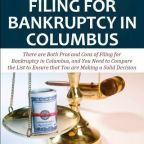When considering bankruptcy in Columbus, it is important to know how your assets will be treated. Obviously, this is true of all your assets, but there is one important one that some Columbus bankruptcy lawyers may forget about. When preparing with your bankruptcy attorney in Columbus, you should become familiar with how the local court will deal with your tax refund.
Whether or not you lose your refund depends on many factors, but one of the most significant is whether you’re looking to file Chapter 7 or Chapter 13 bankruptcy with your attorney in Ohio. Generally speaking, filing for Chapter 7 bankruptcy allows you to protect a tax refund. On the other hand, this is not typically the case with Chapter 13 bankruptcy.
Tax refunds are treated differently based on the type of bankruptcy you are filing, as well as where you live. In addition to the type of bankruptcy you are filing, there are other details your trustee will take into consideration, including when you are filing for bankruptcy as well as the steps you take to protect the refund.
Chapter 7 Bankruptcy and Tax Refunds
When you file for Chapter 7 bankruptcy with your lawyer in Columbus, your refund, even if you have yet to file for that year, is considered an asset by the court. Just the same as other assets, if your refund is exempt the court does not have the legal right to take it from you.
The allowable exemption amount is different in each state, so the actual amount of your refund will have a lot to say about whether or not you can keep it. Be sure to consult with your Chapter 7 bankruptcy attorney in Ohio about what the specifics of your situation may be, and how it may affect your tax refund during the bankruptcy process.
Chapter 13 Bankruptcy and Tax Refunds
With Chapter 13 bankruptcy, you can expect your bankruptcy trustee to closely monitor any refunds due to you during the life of your repayment plan, which typically lasts three to five years.
If you get involved with a repayment plan that pays less than the total amount of your debt, the trustee may keep your refund if it exceeds $2500. Furthermore, a Chapter 13 bankruptcy filing requires that all disposable income be made available through the plan. Unfortunately for the person who is filing for Chapter 13 bankruptcy, tax refunds fit this mold.
That means that your tax refund could be subject to your bankruptcy settlement not just in the year you file, but for subsequent years during your repayment plan.
Tax Refunds in Columbus Bankruptcy
These are only a few of the things you need to consider about whether or not you will keep your tax refund when filing with your bankruptcy lawyer in Columbus.
Are you confused as to how your refund will be treated by the bankruptcy trustee? Consult with an experienced bankruptcy attorney in Columbus who can review your case, help you decide which type of bankruptcy is best, and then make it simple for you to understand what will happen to your refund this year and in subsequent years.





